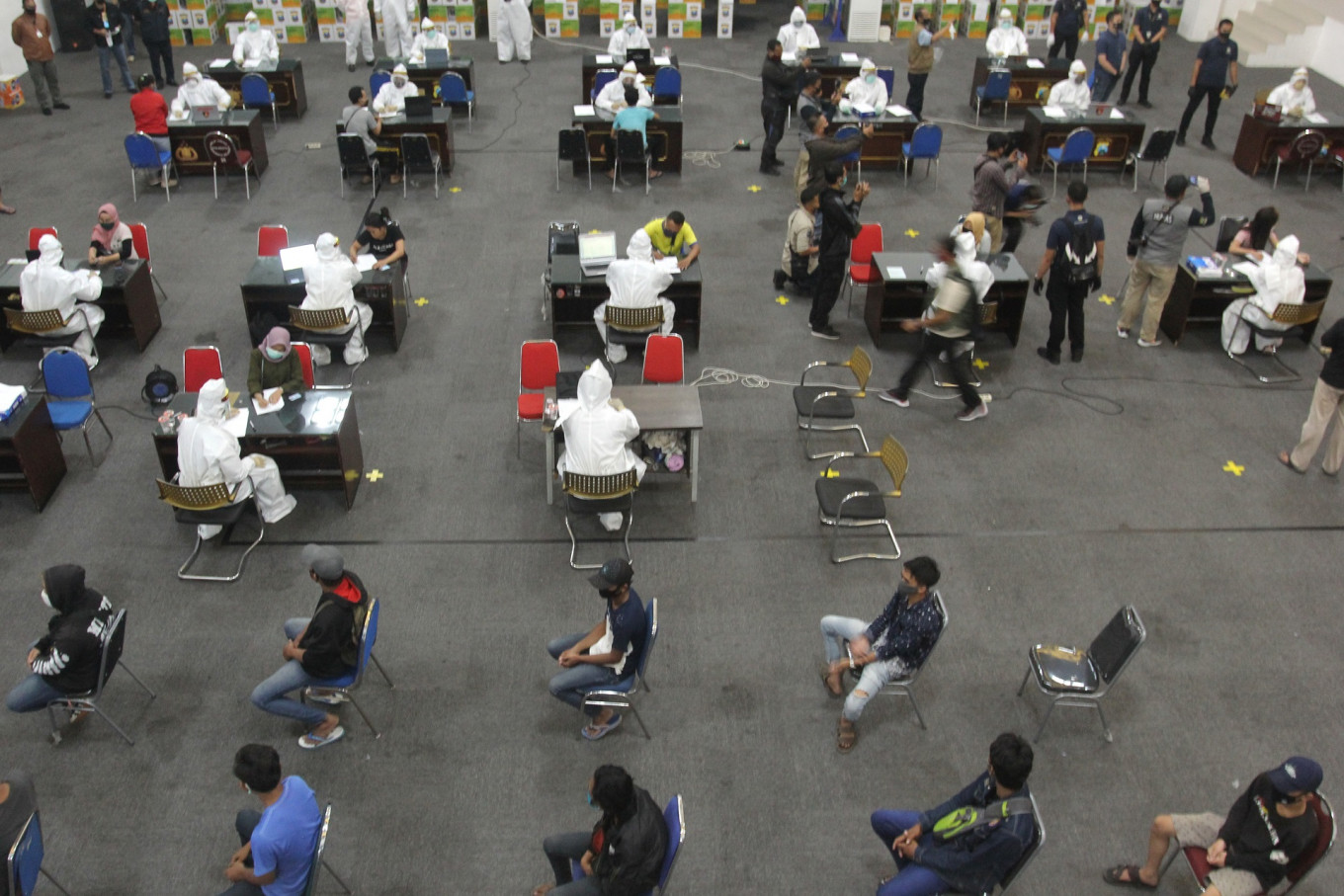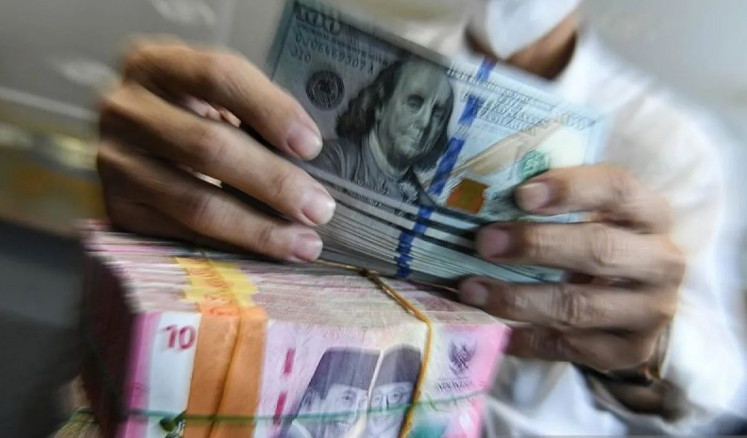Popular Reads
Top Results
Can't find what you're looking for?
View all search resultsPopular Reads
Top Results
Can't find what you're looking for?
View all search resultsEast Java, second hardest-hit province after Jakarta, struggles to control virus spread
Change text size
Gift Premium Articles
to Anyone
East Java has become the province second hardest-hit by COVID-19 after Jakarta, with patients overwhelming healthcare facilities.
The province, home to some 40 million people, reported on Thursday a record jump of 502 new cases in a day, taking the total confirmed cases to 2,998 and 241 deaths, with only 403 patients having recovered, according to the central government's tally.
It is the highest daily spike ever recorded by any province in Indonesia, even surpassing that of Jakarta.
Half of East Java’s confirmed cases were reported in its capital Surabaya, Indonesia's second-largest city and a thriving trade hub.
East Java has recorded 5,274 patients under surveillance (PDPs) and 23,151 people under observation (ODPs), who are suspected of having contracted the virus but have not yet been tested or are waiting for their test results to come back, with 601 fatalities recorded among these two groups.
Yet, the provincial administration has only imposed large-scale social restrictions (PSBB) in Surabaya and its two satellite regencies Sidoarjo and Gresik, and in Malang city and neighboring Batu city and Malang regency, despite all of East Java’s 38 cities and regencies having confirmed at least one case each.
"We have recommended that the PSBB should be enforced in the entire province before all the cities and regencies in East Java are declared red zones. The number of PDPs in East Java is very high [...] stretching throughout the province," said Windhu Purnomo, a leading epidemiologist at Surabaya-based Airlangga University’s School of Public Health.
He said the PDPs had more than a 60 percent chance of being infected with the virus.
East Java, the home base of the country’s largest Islamic organization Nahdlatul Ulama (NU), is torn between virus-containment efforts and religious customs, especially during Ramadan.
Governor Khofifah Indar Parawansa last week decided to allow mass prayers in mosques, including for Idul Fitri, after she learned about the Indonesian Ulema Council's (MUI) suggestion that the province open mosques for Idul Fitri mass prayers as long as the activity follows health procedures. On Monday, she retracted the permit.
Read also: COVID-19 kills elderly, haunts the young in Indonesia
Experts have criticized the weak enforcement and poor compliance in the first period of PSBB in Greater Surabaya between April 28 and May 11. Authorities have extended the PSBB until May 25.
A recent online survey conducted by the alumni association of Airlangga University’s School of Public Health found that places of worship, offices and factories mostly remained operational without health protocols.
Windhu blamed the central government for aggravating the situation in East Java by allowing factories to stay in operation nationwide even in areas under the PSBB.
East Java Manpower and Transmigration Agency recorded more than 6,000 companies or factories continuing to operate across the province, including in PSBB-imposed areas.
Local health authorities recently discovered a new cluster of infections from the Surabaya factory of tobacco giant HM Sampoerna, which was still running during the early implementation of the PSBB and was later temporarily closed after two of its workers died of COVID-19. As of May 11, at least 41 confirmed cases were linked to the factory.
Authorities have identified 72 transmission clusters across the province so far.
Among the first and largest clusters was a training session for haj tour organizers at the Surabaya haj dormitory in mid-March, which saw some 400 officials gather from health and religious affairs agencies in East Java, Bali and East Nusa Tenggara. At least 167 confirmed cases have been linked to that event, with many of the participants becoming sources of new transmissions in their respective regions.
Dozens of confirmed COVID-19 cases in East Java were imported from Greater Jakarta and more than half of its total confirmed cases were from unknown sources of infection.
"The higher the proportion of cases with sources of infection the authorities fail to identify, the worse the situation we are facing. It is uncontrolled and we cannot even estimate the real number of infections," Windhu said.
Read also: COVID-19 creeps into Jakarta's kampungs
Half of the patients admitted to the Dr. Soetomo COVID-19 referral hospital in Surabaya said they did not know where they had contracted the virus, only that they had been in a crowd in the past 14 days, according to the hospital's head of emerging and re-emerging infectious diseases, Soedarsono.
COVID-19 national task force chief Doni Monardo said on Monday that the province had seen a 70 percent spike in weekly cases, while the number of filled hospital beds in East Java was relatively higher than other provinces. About 95.2 percent of hospital beds at Dr. Soetomo Hospital and 73.5 percent at Saiful Anwar Hospital in Malang were filled, he said.
East Java has a total of 132 beds in negative-pressure isolation rooms with ventilators, 693 beds in negative-pressure rooms, 1,500 beds in standard isolation rooms and 950 beds in observation rooms, according to data from the provincial COVID-19 task force.
Soedarsono said around 30 percent of COVID-19 inpatients at Dr. Soetomo Hospital were admitted to the intensive care unit -- 60 percent of whom needed breathing aids.
New patients, he said, kept coming to the hospital and the backlog of polymerase chain reaction (PCR) testing left current patients with no option but to stay longer at the hospital pending their test results, which would hopefully see them clear of the virus and free to leave the hospital.
But looking at mere numbers would not be enough to raise people's awareness of how serious the disease was, he said.
"It is probably because people do not know what is happening in the hospitals; how their friends and neighbors are suffering in hospitals while hospital workers have become exhausted," he said.
Editor's note: This article has been updated to clarify that Nahdlatul Ulama did not pressure East Java Governor Khofifah Indar Parawansa into allowing mass prayer in mosques. We apologize for the error.










